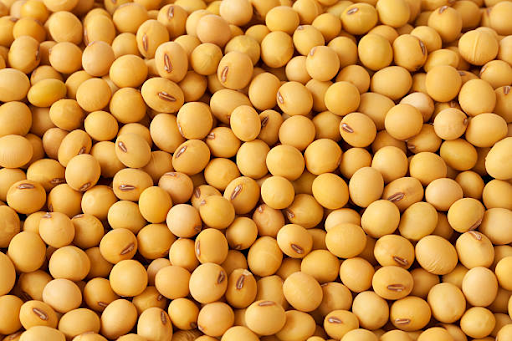Throughout ancient times, people have enjoyed soy in various dishes, from whole soybeans to tofu, tempeh, and soy milk. Many studies have looked at the impact of soy on various facets of human health in recent years because of its possible health advantages. And in this post, we’ll look at five of soy’s most well-studied health advantages, from heart health to cancer prevention. By the end, you’ll better know how consuming soy might enhance general health and lifespan.
What is Soy?
Soy is one of the world’s healthiest foods, a source of protein, fiber, vitamins, and minerals without cholesterol or saturated fats. Originating in Southeast Asia thousands of years ago, soybeans are extremely versatile and can be prepared in many forms, including tofu, tempeh, and edamame.
While it all started in Southeast Asia, many countries have adopted the plant, including the U.S. In fact, the U.S. is one of the world’s largest producers of soybeans, with vast expanses of farmland dedicated to growing this essential crop. Brands like U.S. Soy offer soy for several uses, including animal feed, food, and industrial applications. It is sold to countries worldwide because of its exceptional quality, uniformity, and nutritional value.

Aside from being low in saturated fat and cholesterol-free, soy products are an excellent source of protein. A cup of cooked soya beans provides 28g of protein, more than twice the amount found in a serving size of chicken breast. Also, soy is rich in iron, calcium, and omega-3 fatty acids, all important for maintaining good physical health.
Further, the isoflavone compounds present in high concentrations make it good for overall well-being. Studies suggest these compounds may help reduce unhealthy cholesterol levels and support bone health by slowing down bone loss.
Health Benefits of Soy
1. It May Improve the Skin
Soybeans may help protect your skin from the harmful effects of ultraviolet (UV) radiation. It contains bioactive ingredients like tannins, isoflavonoids, trypsin inhibitors, and proanthocyanidins that benefit the skin. Also, studies have indicated that extracts taken from soybeans may help reduce inflammation in the skin and stimulate the production of collagen fibers to aid in overall wound healing and skin regeneration.

Aside from these benefits, soybean trypsin inhibitors can help reduce pigmentation deposition. These proteins show depigmentation properties which can help lighten the skin. Soybeans also contain anthocyanins inhibiting melanin formation, helping maintain skin tone and coloration. All these components combined make for an effective natural remedy for improving your overall skin health and protecting it from UV damage.
2. It May Improve Heart Health
A diet that includes soya beans could be beneficial to heart health. These little beans are packed with nutrition that can help reduce cholesterol levels. Even studies have found that the compounds known as phytosterols, structurally similar to cholesterol, can inhibit cholesterol absorption in the body. That’s why regular consumption of soy-based products has been associated with lower LDL and total cholesterol levels.
Besides reducing bad cholesterol levels, consuming legumes such as soy may protect against heart disease. This is likely because legumes contain other beneficial nutrients and phytochemicals.
Further, they are rich in dietary fiber, which helps maintain a healthy balance between lipids and glucose levels in the blood. Therefore, incorporating soy into a balanced diet may improve heart health overall.
3. It May Support Bone Health
One way to support healthy bones in post-menopausal women is soy-based foods. Soybeans are a rich source of isoflavone, which may act as an alternative to estrogen and help reduce calcium loss from bones during menopause.
Research shows that 40-110mg of soy isoflavone daily can decrease bone loss and enhance bone mineral density. To achieve this intake level, around 140-440g of tofu or 35-100g of cooked soya beans would be required daily.
Soya foods may be a helpful addition to any balanced diet for women over 50. However, other dietary and lifestyle interventions, such as regular physical activity and calcium-rich foods, are also important for maintaining healthy bones. Also, medical advice should be sought if you have concerns about osteoporosis risk or experience sudden changes to your bone health.
4. It May Improve Blood Circulation
The numerous health benefits of soybean are well established, with it being known to have essential minerals, like iron and copper, that can significantly improve blood circulation. Also, soy isoflavones can help increase nitric oxide levels in post-menopausal women, further improving vascular functions. These beneficial effects all help ensure the proper, efficient delivery of oxygen and nutrients throughout the body.
5. It May Aid Digestion
Soybean is a great dietary fiber source, essential for healthy digestion. It helps bulge your stool and stimulate the peristaltic motion of your intestines, allowing the food to move through properly. Also, the dietary fiber in soybean can help with constipation relief.

When the intestines push out the waste smoothly due to the presence of fibers, it prevents any pain or disruption while passing stools. Further, it reduces the chances of diseases like colorectal cancer or hemorrhoids due to constipation.
Conclusion
Soybean is a nutritious powerhouse with a plethora of health advantages. They are good for lowering cholesterol and improving heart, bone, and blood circulation. Given these advantages, adding soybeans to a well-balanced diet may improve general health.




